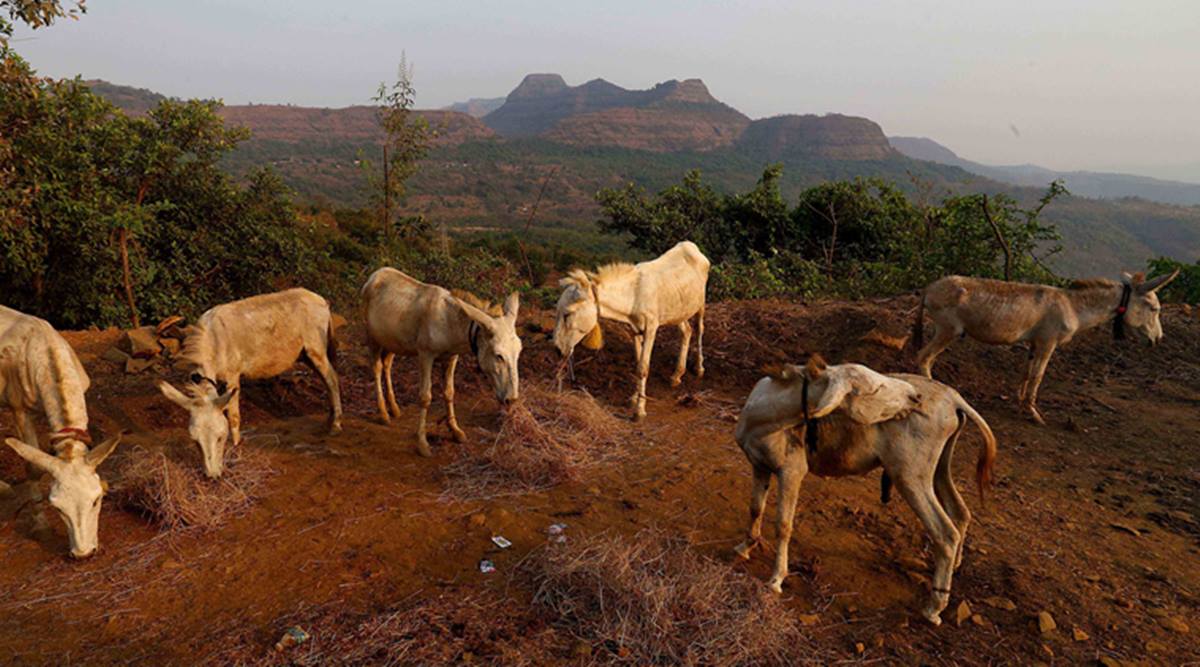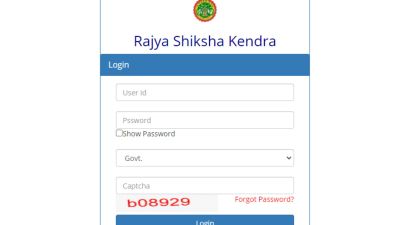- India
- International
Ensuring donkeys stranded at Raigad Fort don’t go hungry amid lockdown: Officials
With conservation work brought to a halt in the wake of the lockdown, 91 donkeys and 41 people, who brought them in a truck, have been stranded at the bottom of the fort in temporary canvas sheds overlooking Hirkani Buruj.
 Donkeys were brought from various places to work in Raigad fort.
Donkeys were brought from various places to work in Raigad fort.
The SOS call came from a small village in Raigad. What followed was a coordinated effort between the district administration in Alibaug, officials of the animal husbandry department in Mahad and a little generosity of the gram panchayat of Nizampur to ensure that 91 donkeys brought to Raigad from Ratnagiri, Satara and Ahmednagar did not go hungry amid the countrywide lockdown.
The beasts of burden were brought to Raigad for no ordinary task. They have been in the district with their owners since Dussehra last year. They play an important part in the conservation and development of Raigad Fort — the hill fort built at a height of 875 metres that became the capital of Maratha warrior king Chhatrapati Shivaji Maharaj in 1674 — undertaken by the Raigad Development Authority.
“Since it is a stairway that leads to the fort, no vehicle can be used to carry the stones required for conservation and restoration work that has been going on for some time now. The donkeys are used to ferry this construction material to the top of the mountain,” explains Dr D S Sonawale, Assistant Commissioner, animal husbandry department in Mahad, the taluka in which Nizampur is located.
Raigad, he said, has no donkeys and they had to be brought from other districts. “Our livestock supervisor in Nizampur informed us that with the lockdown, the owners of the donkeys were unable to go to nearby towns to buy hay and left to themselves to graze, the donkeys did not have enough fodder,” said Sonawale.
At first, over a 100 donkeys were brought to Raigad for the fort conservation work, says Balu Pawar, who came to Raigad from Khatav taluka in Satara with seven donkeys. With conservation work brought to a halt in the wake of the lockdown, 91 donkeys and 41 people, who brought them in a truck, have been stranded at the bottom of the fort in temporary canvas sheds overlooking Hirkani Buruj, the bastion that, according to legend, was named after the milkmaid who, in the dead of the night climbed down the cliff to go back to her baby.

 With fodder arriving, the donkey owners feel this would help them tide over the next few days and with a process set in motion.
With fodder arriving, the donkey owners feel this would help them tide over the next few days and with a process set in motion.
Pawar said that some people had left the place before the lockdown on March 24 and walked back to the neighbouring district of Ratnagiri with their donkeys. Those who came from further off, stayed put.
“We have been getting food through the distribution measures taken in the village but we could no longer go up to Mahad (about 25 km from Nizampur) to get hay or rice barn for our donkeys. There isn’t enough here for so many of them to graze on,” said Baban Pawar, owner of eight donkeys.
He is interrupted by the abrupt braying of one of his donkeys that soon resumes grazing on the newly replenished hay, one ear flopped over its right eye. Pawar said they had to reach out to the administration for help after struggling for weeks after the lockdown that was first scheduled till April 14. The call for help soon reached the district headquarters in Alibaug after which District Collector, Raigad, Nidhi Chaudhari, learnt that under the lockdown it would not be possible to repatriate the donkeys to their home districts where fodder could be easily available.
“We have been getting all kinds of requests from people facing difficulties during the lockdown like people wanting to visit a particular doctor and we have been trying to help them in whatever way we can. This request was very different from others but as soon as I got a call from one of the donkey owners, I asked our animal husbandry department to step in to find a solution.” The Collector’s office pushed buttons that, within hours, activated a network of administration staff and supportive locals, that joined forces like they can only in a village.
Dr Namdev Gholap, livestock supervisor, panchayat samiti, Mahad, then reached out to the sarpanch of Nizampur Pramila Sawant to facilitate the fodder. Sharmila’s husband Prabhakar Sawant said that after Gholap’s call, he reached out to the neighbouring village of Baulwadi, where rice farmers had stacked up hay, dried foliage from their rice harvest.
“Our gram panchayat is not very rich but we thought we should extend a helping hand and that is why we procured 100 stacks of hay for the donkeys from the neighbouring village. It cost us Rs 3,000,” said Prabhakar.
The hay was delivered to the donkey owners at the bottom of the fort in a truck on the same day last week. A day later, another truckload of rice barn, used as donkey fodder, also arrived, said Sonawale.
With fodder arriving, the donkey owners feel this would help them tide over the next few days and with a process set in motion, they are hopeful of more arriving.
Sarika Chavan, who brought her 19 donkeys from Chiplun, now waits for work to resume. “At one time, one donkey can carry two large, cut stones on each side of its back. One trip to the top of the mountain (over 1,500 steps) and back takes over an hour and half. We start early in the morning and by 11 am, we finish two trips daily with our donkeys. But since the lockdown, the work has stopped. It will now be delayed and it might be a year before we can go back home,” she said.”
Must Read
Apr 23: Latest News
- 01
- 02
- 03
- 04
- 05




































